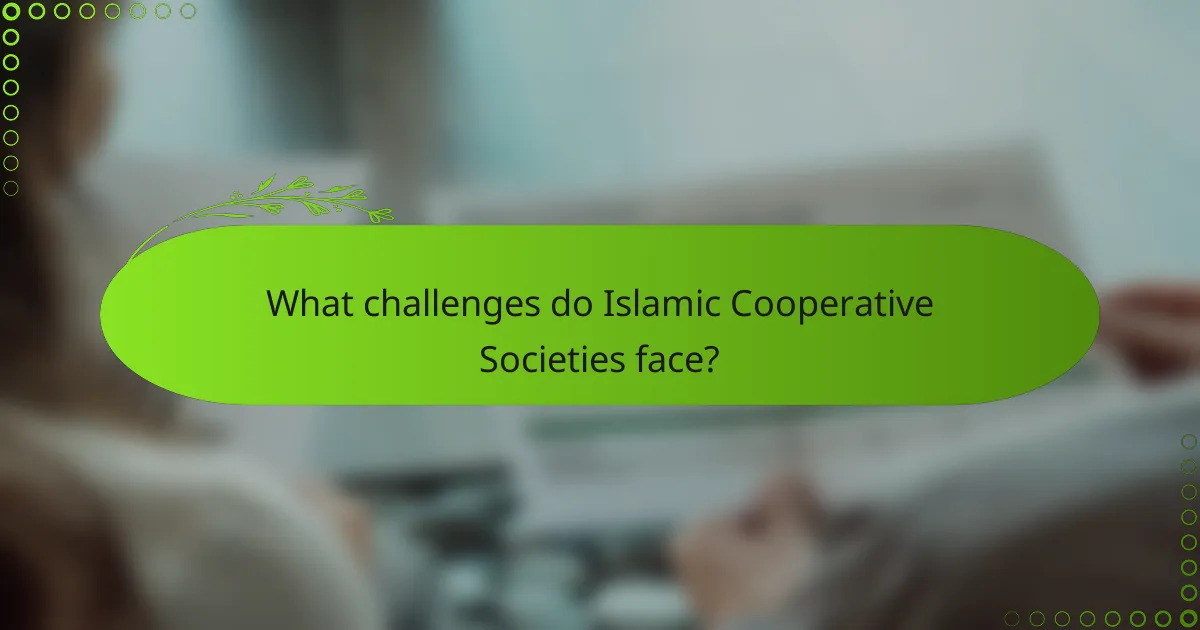
What are Islamic Cooperative Societies?
Islamic Cooperative Societies are organizations that operate based on Islamic principles of cooperation and mutual assistance. They aim to provide financial and social services to their members while adhering to Sharia law. These societies focus on collective ownership and democratic management. Members contribute capital and share in the profits and losses according to agreed terms. Islamic Cooperative Societies promote ethical investment and avoid interest-based transactions. They play a significant role in enhancing economic stability within communities. Their activities often include microfinance, savings, and agricultural support. Research shows that these societies contribute to poverty alleviation and empowerment among marginalized groups.
How do Islamic Cooperative Societies operate?
Islamic Cooperative Societies operate based on principles of mutual assistance and Islamic finance. These societies are formed by individuals pooling resources to achieve common economic goals. Members contribute capital and share profits according to pre-agreed ratios. They operate under Shariah law, which prohibits interest and promotes ethical investments. Decision-making is often democratic, with members voting on key issues. The societies also focus on community welfare, offering services like microfinance and education. Evidence shows that these cooperatives enhance local economies and empower disadvantaged groups. Studies indicate they can improve financial literacy and promote entrepreneurship within communities.
What principles guide the functioning of Islamic Cooperative Societies?
Islamic Cooperative Societies function based on principles derived from Islamic teachings. These principles include mutual cooperation, shared responsibility, and ethical conduct. They emphasize the importance of social justice and community welfare. Profit-sharing is a key aspect, ensuring equitable distribution among members. The prohibition of interest (riba) guides financial transactions within these societies. Transparency and accountability are crucial for maintaining trust among members. Additionally, the societies aim to promote economic self-sufficiency and empowerment within the community. These principles collectively ensure that the operations align with Islamic values and contribute positively to society.
What roles do members play in Islamic Cooperative Societies?
Members in Islamic Cooperative Societies play essential roles that contribute to the organization’s objectives. They participate in decision-making processes, influencing policies and practices. Members also contribute capital, which is vital for financing cooperative activities. They engage in profit-sharing, receiving returns based on their contributions. Additionally, members provide labor, enhancing the operational efficiency of the cooperative. They often promote ethical practices aligned with Islamic principles, ensuring compliance with Sharia law. Members also support community development initiatives, reinforcing social responsibility. Their active involvement fosters a sense of ownership and commitment to the cooperative’s success. These roles collectively enhance the economic viability of Islamic Cooperative Societies.
What economic roles do Islamic Cooperative Societies fulfill?
Islamic Cooperative Societies fulfill several economic roles, including promoting financial inclusion, enhancing community welfare, and facilitating trade. They provide access to financial services for underserved populations. This includes microfinance and savings options that align with Islamic principles. Additionally, they support local businesses through cooperative purchasing and marketing initiatives. Research indicates that these societies contribute to poverty alleviation by creating jobs and encouraging entrepreneurship. For example, a study by the International Cooperative Alliance highlights their role in fostering economic resilience in communities. Overall, Islamic Cooperative Societies play a vital role in strengthening local economies.
How do Islamic Cooperative Societies contribute to local economies?
Islamic Cooperative Societies contribute to local economies by promoting economic empowerment and social welfare. They provide access to financial services for underserved communities. This includes microloans and savings programs that support small business development. The cooperative model fosters community engagement and collective decision-making. It encourages members to invest in local initiatives. This leads to job creation and increased local production. Studies show that such societies enhance economic stability in regions with limited resources. They also promote ethical business practices aligned with Islamic values.
What impact do Islamic Cooperative Societies have on employment rates?
Islamic Cooperative Societies positively impact employment rates by fostering job creation and economic stability. These societies operate on principles of mutual assistance and ethical finance. They often provide financing and support to small businesses. This support leads to increased entrepreneurship and job opportunities. Research shows that regions with active Islamic Cooperatives experience lower unemployment rates. For instance, a study by the International Cooperative Alliance highlighted that cooperatives create 20% more jobs compared to traditional businesses. Therefore, Islamic Cooperative Societies play a crucial role in enhancing employment opportunities within their communities.

What are the benefits of Islamic Cooperative Societies?
Islamic Cooperative Societies provide various benefits that enhance economic stability. They promote mutual assistance among members, fostering community solidarity. Members can access financing without interest, adhering to Islamic principles. These societies often support local businesses, stimulating economic growth in their communities. They also encourage savings among members, leading to increased financial security. Additionally, they provide a platform for skill development and education. By pooling resources, members can undertake larger projects that benefit the entire community. Overall, Islamic Cooperative Societies contribute to sustainable economic development while aligning with ethical values.
How do Islamic Cooperative Societies promote financial inclusion?
Islamic Cooperative Societies promote financial inclusion by providing accessible financial services to underserved communities. They operate on Islamic principles, which prohibit interest and promote risk-sharing. This model allows for microfinance options that cater to low-income individuals. By offering profit-sharing arrangements, these societies encourage savings and investment among members. They also foster a sense of community and mutual support, which enhances trust in financial transactions. Research indicates that Islamic Cooperative Societies have successfully increased financial literacy and awareness in their communities. This approach has led to improved economic participation and empowerment for marginalized groups.
What services do they provide to underserved communities?
Islamic cooperative societies provide various services to underserved communities. These services include access to microfinance, which helps individuals start small businesses. They also offer educational programs aimed at improving financial literacy. Additionally, they provide health services, including affordable medical care and health insurance. These societies often engage in community development projects, enhancing local infrastructure. They promote agricultural support, aiding farmers with resources and training. Furthermore, they facilitate social welfare programs that assist vulnerable populations. Overall, these services aim to empower underserved communities economically and socially.
How do Islamic Cooperative Societies facilitate access to capital?
Islamic Cooperative Societies facilitate access to capital through collective pooling of resources. Members contribute funds, creating a shared capital base. This capital is then used to provide interest-free loans to members. The cooperative model promotes mutual assistance and financial support. It adheres to Islamic finance principles, avoiding interest-based transactions. This structure enhances financial inclusion for underserved communities. Studies show that these societies improve economic stability and empower members financially. They also foster entrepreneurship by offering financing options that align with Islamic values.
What are the social impacts of Islamic Cooperative Societies?
Islamic Cooperative Societies significantly impact social cohesion and community development. They promote collective responsibility among members. This fosters a sense of belonging and mutual support. These societies often provide financial services to underserved populations. They enhance economic stability by creating job opportunities. Additionally, they encourage ethical business practices aligned with Islamic principles. Research indicates that cooperative societies improve social welfare in local communities. For instance, a study by the International Cooperative Alliance highlights their role in poverty alleviation.
How do they contribute to community development?
Islamic cooperative societies contribute to community development by fostering economic empowerment and social cohesion. They provide financial services to members who may lack access to traditional banking. This inclusion helps stimulate local economies and reduce poverty levels. Furthermore, these societies often reinvest profits back into the community. They support local businesses and create job opportunities. Research indicates that communities with active cooperative societies experience higher levels of social trust and collaboration. This collective effort enhances community resilience and overall well-being.
What role do they play in promoting social cohesion?
Islamic cooperative societies play a significant role in promoting social cohesion. They foster community engagement and mutual support among members. These societies encourage collective participation in economic activities. This participation strengthens interpersonal relationships and trust among individuals. Furthermore, they provide financial assistance and resources to members in need. This support enhances social safety nets within communities. Studies show that such organizations can reduce economic disparities. By addressing mutual interests, they create a sense of belonging and unity.

What challenges do Islamic Cooperative Societies face?
Islamic Cooperative Societies face several challenges. One major challenge is compliance with Shariah law. This can complicate financial operations and product offerings. Another challenge is limited access to capital. Many societies struggle to secure funding from conventional financial institutions. Additionally, there is a lack of awareness about Islamic cooperatives among potential members. This limits membership growth and participation. Governance issues also pose a challenge, as many societies lack effective management structures. Lastly, competition from conventional cooperatives can hinder their market share. These challenges affect the overall effectiveness and sustainability of Islamic Cooperative Societies.
What are the financial challenges encountered by Islamic Cooperative Societies?
Islamic Cooperative Societies face several financial challenges. These include limited access to capital due to strict Sharia compliance. Many banks are hesitant to provide loans that align with Islamic finance principles. Additionally, there is often a lack of financial literacy among members. This can hinder effective management and investment decisions within the societies. Furthermore, competition from conventional financial institutions can limit their market share. Operational costs can also be high, affecting profitability. Lastly, regulatory challenges can complicate financial operations. These factors collectively impact the sustainability and growth of Islamic Cooperative Societies.
How do regulatory frameworks affect their operations?
Regulatory frameworks significantly influence the operations of Islamic cooperative societies. These frameworks establish the legal and operational boundaries within which these societies must function. Compliance with regulations ensures that the societies adhere to principles of transparency and accountability. For instance, regulations may dictate financial reporting standards and governance structures.
Adherence to regulatory requirements can enhance member trust and attract new participants. A study by the Islamic Financial Services Board highlights that regulatory clarity fosters growth in cooperative sectors. Furthermore, regulations can impact access to funding and investment opportunities.
Overall, regulatory frameworks shape the operational landscape, guiding practices and promoting sustainable growth within Islamic cooperative societies.
What are the implications of competition from conventional cooperatives?
Competition from conventional cooperatives can impact Islamic cooperative societies in several ways. It can lead to market share loss for Islamic cooperatives. Conventional cooperatives often have established networks and resources. This can make it difficult for Islamic cooperatives to compete effectively. Price competition may force Islamic cooperatives to lower their prices. This could impact their profitability and sustainability. Additionally, conventional cooperatives may offer a wider range of products and services. This can attract customers away from Islamic cooperatives. The competition may also drive innovation within Islamic cooperatives. They may need to enhance their offerings to retain and attract members. Overall, the implications include potential market challenges and opportunities for growth.
How can Islamic Cooperative Societies enhance their economic contributions?
Islamic Cooperative Societies can enhance their economic contributions by promoting member participation and increasing access to financial services. These societies often provide microfinance options tailored to the needs of their members. By offering interest-free loans, they align with Islamic principles and encourage entrepreneurship. Additionally, they can facilitate collective purchasing, reducing costs for members. Education and training programs can improve members’ skills, leading to better business practices. Furthermore, fostering community development projects can stimulate local economies. Evidence shows that cooperatives can increase income levels and reduce poverty in their communities.
What strategies can be implemented for sustainable growth?
Sustainable growth strategies for Islamic cooperative societies include diversifying income sources and enhancing community engagement. Diversification allows societies to reduce dependency on a single revenue stream. This can be achieved by offering a range of products and services that cater to community needs. Community engagement fosters loyalty and encourages local support. Implementing education and training programs enhances members’ skills and knowledge. This investment in human capital leads to improved productivity and innovation. Additionally, adopting sustainable practices in operations minimizes environmental impact. Research shows that cooperatives implementing such strategies see increased resilience and long-term viability.
How can technology be leveraged to improve efficiency?
Technology can be leveraged to improve efficiency by automating processes and enhancing communication. Automation reduces manual labor and speeds up operations. For example, software tools can streamline inventory management in cooperative societies. Enhanced communication tools facilitate better collaboration among members. This leads to faster decision-making and problem-solving. According to a study by the International Journal of Cooperative Management, technology adoption can increase productivity by up to 30%. Efficient resource allocation is another benefit of technology. Data analytics can help identify areas for cost savings and optimization. Overall, leveraging technology significantly boosts operational efficiency in cooperative societies.
What best practices can Islamic Cooperative Societies adopt for success?
Islamic Cooperative Societies can adopt several best practices for success. First, they should ensure adherence to Sharia principles in all operations. This fosters trust and credibility among members. Second, establishing strong governance structures is essential. Effective leadership can enhance decision-making and accountability. Third, regular training and capacity-building programs for members can improve skills and knowledge. This leads to better management of cooperative activities. Fourth, fostering community engagement can strengthen relationships with local stakeholders. This can enhance support and resources for the society. Fifth, utilizing technology for operations and communication can improve efficiency. Digital tools can streamline processes and increase member participation. Finally, conducting regular assessments and evaluations can help identify areas for improvement. This ensures the cooperative remains responsive to changing needs.
Islamic Cooperative Societies are organizations that operate under Islamic principles of cooperation and mutual assistance, providing financial and social services while adhering to Sharia law. The article examines their economic contributions, emphasizing their roles in promoting financial inclusion, enhancing community welfare, and facilitating trade. It details how these societies operate, the principles guiding them, and the various services they offer to underserved communities. Additionally, the article discusses the challenges they face, strategies for sustainable growth, and best practices for success, highlighting their impact on local economies and social cohesion.